De Duitse schrijver Alfred Andersch werd geboren op 4 februari 1914 in München. Zie ook alle tags voor Alfred Andersch op dit blog.
Uit: Sansibar oder der letzte Grund
„Der Mississippi wäre das Richtige, dachte der Junge, auf dem Mississippi konnte man einfach ein Kanu klauen und wegfahren, wenn es stimmte, was im Huckleberry Finn stand. Auf der Ostsee würde man mit einem Kanu nicht sehr weit kommen, ganz abgesehen davon, daß es an der Ostsee nicht mal schnelle wendige Kanus gab, sondern nur so olle schwere Ruderboote. Er sah vom Buch auf, unter der Treenebrücke floß das Wasser still und langsam durch; die Weide, unter der er saß, hing ins Wasser rein, und gegenüber, in der alten Gerberei, regte sich, wie immer, nichts. Der Mississippi wäre besser als die Speicher in der alten, verlassenen Gerberei und die Weide am langsamen Fluß. Auf dem Mississippi wäre man weg, während man sich auf den Speichern in der Gerberei und unter der Weide nur verstecken konnte. Unter der Weide auch nur, solange sie Blätter hatte, und die hatten schon mächtig begonnen abzufallen und trieben gelb auf dem braunen Wasser davon. Verstecken war übrigens nicht das Richtige, dachte der Junge – man mußte weg sein.
Man mußte weg sein, aber man mußte irgendwohin kommen. Man durfte es nicht so machen wie Vater, der weg gewollt hatte, aber immer nur ziellos auf die offene See hinausgefahren war. Wenn man kein anderes Ziel hatte als die offene See, so mußte man immer wieder zurückkehren. Erst dann ist man weg, dachte der Junge, wenn man hinter der offenen See Land erreicht.”
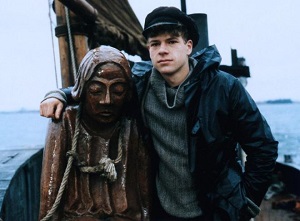
Alfred Andersch (4 februari 1914 – 21 februari 1980)
Scene uit de gelijknamige film uit 1987
De Moldavische dichter en schrijver Grigore Vieru werd geboren in Pereita op 4 februari 1935. Zie ook alle tags voor Grigore Vieru op dit blog.
Mutterwesen
Leicht mein’ Mami, Gotteswesen
Weil du treten könntest mal
Auf die Samen, die leicht schweben
In dem Himmel-Erde All.
In den Augen Angst empfindest,
Trotzdem glücklich bist im Rest –
Zartes Gras weiß wie du heißest,
Und der Stern weiß was du denkst.
Mutters Haar
Wie viele Häuser hast du, Mutter,
Mit Ton verputzt und mit Kalk geweißt!
In deinem Haar bleicht, Mutter,
Der damalige Kalk.
Wie lange habe ich geweint
Im Hunger, wie in einer Zange gepresst!
Nachts, als du Totenwache hieltest.
In deinem Haar bleicht, Mutter,
Das Salz meiner alten Tränen.
Abends ich rüge deinen Enkel,
Weil er nicht artig ist,
Aber er zieht bei dir im Vollen um,
Und weint auch
In deinem Haar.
Vertaald door Nicolae Dabija
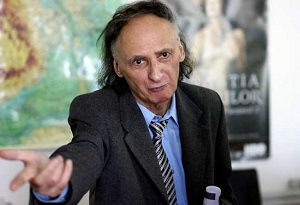
Grigore Vieru (4 februari 1935 – 18 januari 2009)
Cover
De Canadese dichter E. J. Pratt werd op 4 februari 1882 geboren in Western Bay, Newfoundland. Zie ook alle tags voor E. J. Pratt op dit blog.
The Truant (Fragment)
And the little genus homo, six feet high,
Standing erect, countered with this reply —
“You dumb insouciant invertebrate,
You rule a lower than a feudal state —
A realm of flunkey decimals that run,
Return; return and run; again return,
Each group around its little sun,
And every sun a satellite.
There they go by day and night,
Nothing to do but run and burn,
Taking turn and turn about,
Light-year in and light-year out,
Dancing, dancing in quadrillions,
Never leaving their pavilions.
“Your astronomical conceit
Of bulk and power is anserine.
Your ignorance so thick,
You did not know your own arithmetic.
We flung the graphs about your flying feet,
We measured your diameter —
Merely a line
Of zeros prefaced by an integer.
Before we came
You had no name.
You did not know direction or your pace;
We taught you all you ever knew
Of motion, time and space.
We healed you of your vertigo
And put you in our kindergarten show,
Perambulated you through prisms, drew
Your mumu’s through the Milky Way,
Lassoed your comets when they ran astray,
Yoked Leo, Taurus, and your team of Bears
To pull our kiddy cars of inverse squares.
“Boast not about your harmony,
Your perfect curves, your rings
Of pure and endless light — ‘Twas we
Who pinned upon your Seraphim their wings,
And when your brassy heavens rang
With joy that morning while the planets sang
Their choruses of archangelic lore,
‘Twas we who ordered the notes upon their score
Out of our winds and strings.
Yes! all your shapely forms
Are ours — parabolas of silver light,
Those blueprints of your spiral stairs
From nadir depth to zenith height,
Coronas, rainbows after storms,
Auroras on your eastern tapestries
And constellations over western seas.
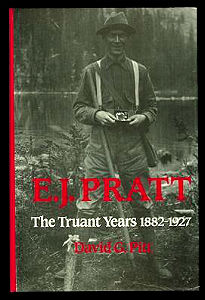
E. J. Pratt (4 februari 1882 – 26 april 1964)
Cover
De Deense schrijver, criticus en filosoof Georg Brandes werd geboren op 4 februari 1842 in Kopenhagen. Zie ook alle tags voor Georg Brandes op dit blog.
Uit: Recollections Of My Childhood And Youth
„I liked my name. My mother and my aunts said it in such a kindly way.
And the name was noteworthy because it was so difficult to pronounce. No boy or girl smaller than I could pronounce it properly; they all said _Gayrok_.
I came into the world two months too soon, I was in such a hurry. My mother was alone and had no help. When the midwife came I had arrived already. I was so feeble that the first few years great care had to be taken of me to keep me alive. I was well made enough, but not strong, and this was the source of many vexations to me during those years when a boy’s one desire and one ambition is to be strong.
I was not clumsy, very agile if anything; I learnt to be a good high jumper, to climb and run well, was no contemptible wrestler, and by degrees became an expert fighter. But I was not muscularly strong, and never could be compared with those who were so.
The world, meanwhile, was so new, and still such an unknown country.
About that time I was making the discovery of fresh elements.
I was not afraid of what I did not like. To overcome dislike of a thing often satisfied one’s feeling of honour.
“Are you afraid of the water?” asked my brisk uncle from Funen one day.
I did not know exactly what there was to be afraid of, but answered unhesitatingly: “No.” I was five years old; it was Summer, consequently rainy and windy.
I undressed in the bathing establishment; the old sailor fastened a cork belt round my waist. It was odiously wet, as another boy had just taken it off, and it made me shiver. Uncle took hold of me round the waist, tossed me out into the water, and taught me to take care of myself.
Afterwards I learnt to swim properly with the help of a long pole fastened to the cork belt and held by the bathing-man, but my familiarity with the salt element dated from the day I was flung out into it like a little parcel. Without by any means distinguishing myself in swimming, any more than in any other athletic exercise, I became a very fair swimmer, and developed a fondness for the water and for bathing which has made me very loth, all my life, to miss my bath a single day.”
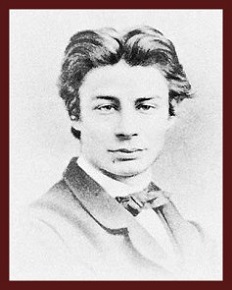
Georg Brandes (4 februari 1842 – 19 februari 1927)
In 1866
De Franse dichter Jacques Prévert werd geboren in Neuilly-sur-Seine op 4 februari 1900. Zie ook alle tags voor Jacques Prévert op dit blog.
Les enfants qui s’aiment
Les enfants qui s’aiment s’embrassent debout
Contre les portes de la nuit
Et les passants qui passent les désignent du doigt
Mais les enfants qui s’aiment
Ne sont là pour personne
Et c’est seulement leur ombre
Qui tremble dans la nuit
Excitant la rage des passants
Leur rage, leur mépris, leurs rires et leur envie
Les enfants qui s’aiment ne sont là pour personne
Ils sont ailleurs bien plus loin que la nuit
Bien plus haut que le jour
Dans l’éblouissante clarté de leur premier amour
Fiësta
En leeg waren de glazen
en de flessen kapot
En het bed dat lag open
en de deur zat op slot
En op de vuile vloer,
schitterden in het stof
de scherven als sterretjes
van schoonheid en geluk
En ik was laveloos
ik stond in vuur en vlam
en jij lag bandeloos
in mijn armen, bloot.
Paris at night
Drie lucifertjes een voor een aangestreken in de nacht
Het eerste om heel je gezicht te kunnen zien
Het tweede om je ogen te zien
Het derde om je mond te zien
En dan heel het donker om dat alles vast te houden
Als ik je in mijn armen neem.
Vertaald door Wim Hofman
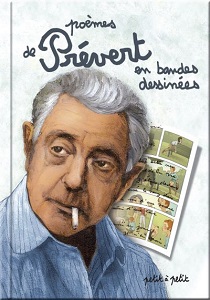
Jacques Prévert (4 februari 1900 – 11 april 1973)
Cover
De Franse dichter en schrijver Jean Richepin werd geboren op 4 februari 1849 in Médéa, Algerije. Zie ook alle tags voor Jean Richepin op dit blog.
Sonnet grec
C’était un grand sculpteur que le Grec Praxitèle.
La légende pourtant nous raconte qu’un jour,
Voulant faire une coupe et ne rien mettre autour,
Il ne vit point de forme assez pure pour elle.
Mais le soir, fatigué de son travail rebelle,
Comme il baisait un sein façonné par l’amour,
Tout à coup il trouva. Ce bouton ! ce contour
Et la coupe naquit sur ce parfait modèle.
La femme dont la gorge avait un tel dessin
Qu’on moula l’idéal aux rondeurs de son sein,
Cette déesse en chair, comment se nommait-elle ?
Nul ne le sait. Mais grâce au sculpteur, à l’amant,
La coupe a survécu dans sa forme immortelle,
Et sa beauté demeure impérissablement.
Rondeau
Votre beau thé, moins rare que vos yeux,
Votre thé vert, fleuri, délicieux,
Qui vaut quasi dix mille francs la livre,
Moins que la fleur de vos yeux il enivre
Et fait rêver qu’on s’en va dans les cieux.
J’ai bu les deux aromes précieux ;
Et jusqu’au jour dans mon lit soucieux
Il m’a sonné des fanfares de cuivre,
Votre beau thé.
Je vous voyais passer parmi les Dieux,
Dans un grand char aux flamboyants essieux ;
Et sous la roue en or, n’osant vous suivre,
J’ai mis mon front, et j’ai cessé de vivre
En bénissant, écrasé mais joyeux,
Votre beauté.
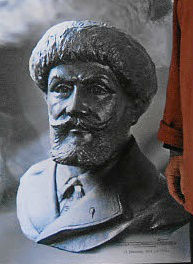
Jean Richepin (4 februari 1849 – 12 december 1926)
Borstbeeld
De Zweedse Rokoko-dichter en componist Carl Michael Bellman werd geboren op 4 februari 1740 in Stockholm. Zie ook alle tags voor Carl Michael Bellman op dit blog.
Drink out thy glass
Drink out thy glass! See, on thy threshold, nightly,
Staying his sword, stands Death, awaiting thee.
Be not alarmed; the grave-door, opened slightly,
Closes again; a full year it may be
Ere thou art dragged, poor sufferer, to the grave.
Pick the octave!
Tune up the strings! Sing of life with glee!
Golden’s the hue thy dull, wan cheeks are showing;
Shrunken’s thy chest, and flat each shoulder-blade.
Give me thy hand! Each dark vein, larger growing,
Is, to my touch, as if in water laid.
Damp are these hands; stiff are these veins becoming.
Pick now, and strumming,
Empty thy bottle! Sing! drink unafraid.
. . . . .
Skal, then, my boy! Old Bacchus sends last greeting;
Freya’s farewell receive thou, o’er thy bowl.
Fast in her praise thy thin blood flows, repeating
Its old-time force, as it was wont to roll.
Sing, read, forget; nay, think and weep while thinking.
Art thou for drinking
Another bottle? Thou art dead? No Skal!
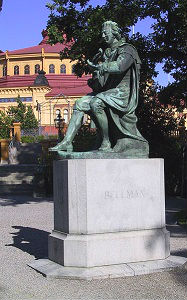
Carl Michael Bellman (4 februari 1740 – 11 februari 1795)
Standbeeld in Stockholm
Zie voor bovenstaande schrijvers ook mijn blog van 4 februari 2007 en ook mijn blog van 4 februari 2008 en eveneens mijn blog van 4 februari 2009.
